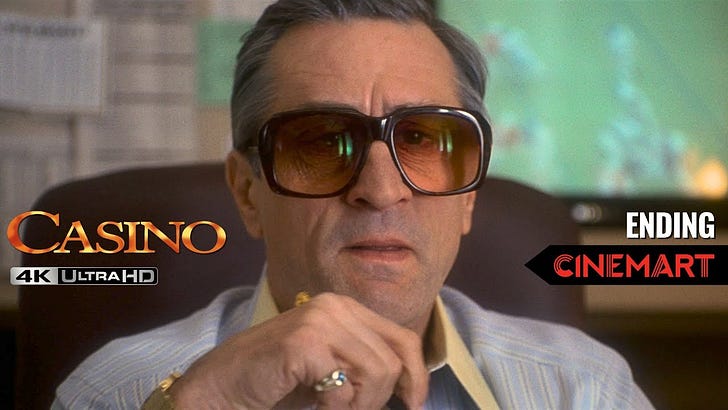Copyright thebignewsletter

Earlier this year, Maryland state Senator Joanne C. Benson did something remarkable. She introduced Senate bill 1033, written for the “purpose of repealing online sports wagering” in the state. Now, I wouldn’t normally say a random state legislator introducing a proposal is a big deal. Except in this case, it’s the start of a counter-attack on the proliferation of corporate-run gambling across America, a trend that has largely gone un-rebutted since the 1970s. And Benson is not alone; lawmakers in Vermont and New York are seeking to push back, and more state legislatures are likely to follow. Why the pushback? The answer is that corporate-run gambling is now pervasive in America, and Americans don’t like what they see. Gambling, particularly online sports betting, is now everywhere. About a fifth of Americans placed a bet in the past year, mostly through gambling apps. Since 2018, when online sports gambling got a big boost from a key Supreme Court decision, Americans have bet more than half a trillion dollars on sports. And the attempts to change our culture are extremely visible; I watched the Dolphins-Ravens game last night on Amazon Prime, and I lost count of the number of ads for DraftKings and FanDuel, with various celebrities lending their names to this cultural phenomenon. Every major sports media network, sports league, and podcast are now working with a major gambling company. At this point, gambling is intrinsic to the financing of sports; FanDuel now operates “15 regional sports networks across the country previously on the brink of bankruptcy.” The broad consequences are also extremely visible. Take athletics. Americans love sports, and that cultural centerpiece is being corrupted in an orgy of greed and speculative ferver. Last week, the government charged six people, including two NBA players, for gambling-related fraud. It’s also contributing to a courser culture, with a lot of unfair pressure on athletes. According to US News, “21% of sports bettors say they’ve verbally abused an athlete, either in person or online, after losing money on a bet.” And that’s not even getting into the costs of fostering a nation of gamblers, lured in by an app-based model that is far more convenient and addictive than traditional in-person betting. Today, four out of five betters are using betting apps or online platforms. A quarter of bettors can’t pay a bill because of their wagers, a third have gambling debts, more than half carry credit card debts, and a quarter of them are afraid they can’t control their gambling. Economists are finding a “substantial increase in average bankruptcy rates, debt sent to collections, use of debt consolidation loans, and auto loan delinquencies” for consumers in states that legalized online sports betting versus those that restrict it to in-person locations. The estimates I’m told privately by experts in the field is that in the next five years, all gambling - including lotteries, Las Vegas casinos, and online sports betting - will likely see Americans lose a trillion dollars or so. Last year, I did an Organized Money episode with Les Bernal and Dr. Kavita Fischer on the problem; Fischer is a psychiatrist who downloaded Draft Kings in 2022 to unwind after putting her kids to bed. She ended up losing $600,000, explaining to the Wall Street Journal the story of how DraftKings used sophisticated techniques to keep her betting, even as she desperately tried to stop. (Most of the loss was not on sports, but on standard casino games.) Online sports betting is reaching new more politically empowered groups. Fischer’s story is very common, and it’s occurring among middle and upper middle class people who were never exposed to other forms of gambling, like state lotteries and casinos. It’s also hitting kids, who themselves are often calling in to help lines with addiction. It’s so common that Saturday Night Live did a viral skit for a fictional company called “Rock Bottom Kings,” which allows people to take bets on their degenerate gambling addict friend’s behavior. Increasingly, people are turning against this form of betting. According to Pew, 43% of U.S. adults say “the fact that sports betting is now legal in much of the country is a bad thing for society,” up from 34% just a few years ago. And that’s concentrated among young men, who are most exposed; “47% of men under 30 say legal sports betting is a bad thing for society, up from 22% who said this in 2022.” And opposition is increasing faster among people who bet than people who don’t. It’s not that people oppose betting with friends, what’s problematic is the ability to build a business around being the house. The Neoliberal Origins of Corporate Gambling In an important sense, it’s odd that we’re even dealing with pervasive corporate-run gambling. Historically, Americans understood systemic gambling, and associated similar abuses of power like usury, as a moral and social catastrophe in waiting. That has been true since the 19th century, with many states making gambling unconstitutional, through to the fixing of the 1919 World Series, but it was also true well into the 20th century, when corporate gambling was constrained to mobster-run places like Las Vegas and Atlantic City. Even into the 1960s, courts prevented the patenting of gambling machines on the grounds they conflicted with the “sound morals of society.” And culturally, we understood it as well, with gambling represented as a sinful and harmful enterprise. Take the 1987 smash hit movie Back to the Future II. In it, the villain, Biff Tannen, uses a time machine to alter the past so that he becomes a wealthy and corrupt casino magnate over a dilapidated town, Hill Valley. The hero, Marty McFly, in turn, must find a way to revert Hill Valley to its previous state. Back to the Future II was the third highest grossing film of 1989, and I remember as a kid we all saw it, and in school all my friends wondered whether hoverboards were real. Everyone just knew that corporate-run gambling was seedy. With a few exceptions, up until the 1960s this attitude applied to all corporate gambling, from sports betting to lotteries, which were seen as similar to the “numbers racket” of the mob. But in 1963, New Hampshire Governor John King, egged on by the conservative Manchester Union Leader, signed a bill to create the first state lottery, to the horror of most newspapers nationwide and the Federal government, which arrested out-of-state residents for buying tickets. Why did New Hampshire allow its new “sweepstakes” game? Well, it was pitched as part of the anti-tax revolution that would take over the nation fifteen years later. One of the key supporters was Bill Loeb, the arch-conservative publisher of the Manchester Union Leader, who “favored the Sweepstakes because he feared without it the Legislature would pass a sales tax — something he abhorred over all else.” Pointing to the state’s reliance on so-called “sin taxes,” Loeb penned the strongest defense of the lottery yet. “No one has to go to the track and bet. No one has to smoke tobacco. No one has to drink. But how do those who oppose the Sweepstakes propose to raise the money? Either a sales tax or a property tax or some other kind of levy that people will have to pay, even though it will hurt them dreadfully to do so.” The New Hampshire lottery served as the “legitimization” of gambling, turning it from a seedy activity into something sanctioned by a state. And it also set in motion the same dynamic with gambling we see today, which is that residents from outside of New Hampshire would buy lottery tickets from that state, because they couldn’t get them where they live. So their state officials would wonder why they are foregoing revenue, leading to a daisy chain of legalization. Corporate gambling tended to expand in a similar pattern. After people saw that a simple state lottery could bring in more revenue, they allowed more complex gambling games, and then in-person casinos and racetracks, slot machines, and sports betting. And every time someone tried to block the expansion, the response was “well people will just do it across state lines.” After New Hampshire, New Jersey and New York created lotteries. Then, in the 1970s, a host of progressive-leaning states across the northeast created lotteries to deal with austerity budgets, and to capture the revenue they were foregoing when their own residents went to other states to buy lottery tickets. These included Connecticut, Massachusetts, Maryland, Maine, Illinois, Ohio, Rhode Island, Vermont, Pennsylvania, and Michigan. Much of the rest of the country legalized lotteries in the 1980s for similar reasons, though a few states - Utah, Alaska, and Hawaii - have not. In the South, religious conservatives opposed gambling, but Reagan Republicans changed this dynamic. Moral scold Bill Bennett, who wrote “The Book of Virtues” and served as Secretary of Education and Drug Czar under Reagan, exempted gambling from his list of sins, himself carrying millions in gambling debts. A key actor was eventual RNC Chair Frank Fahrenkopf, who brought casino interests into the national Republican world, welding it together with Wall Street cash and big hotel chains by forming the American Gaming Association. Corporations got into gambling in a major way. “Before 1989, you couldn’t get mainstream, Wall Street money in this industry,” said one reporter. “Now, not only can you get, they’re throwing it at you.” Fahrenkopf talked about the inflow of big corporate interests, it was now “professionals - people who have gone to business school.” These were “some of the brightest business men and women now involved in running these companies,” with the ability to “sit down with Goldman Sachs, or Bear Sterns or whoever it might be and convince them that number one, it’s a legitimate business.” Martin Scorcese, in the ending of the iconic movie Casino, described this shift from the mob control of Vegas to Wall Street control. “Where did the money to rebuild the pyramids come from?” asked Las Vegas Sands casino leader and mobster Sam “Ace” Rothstein after he lost control of the town. “Junk Bonds.” When the internet became mainstream in the 1990s, online gambling wasn’t legal, but online gambling offerings from offshore casinos became a major problem. Tennessee Senator Bill Frist, with a coalition of progressives and religious conservatives, moved a bill called the Unlawful Internet Gambling Enforcement Act in 2006, which banned money transfers to offshore gaming companies. But the UIGEA had an exemption for fantasy sports, which proponents laughably called a game of skill and not chance. Over the course of the next two decades, the firms that took advantage of this law then unleashed a state-by-state lobbying campaign to legalize online sports betting. The Supreme Court, in 2018, said states could legalize online sports gambling, unleashing a lobbying campaign such that 39 states now allow it. Today, when you pass sports bars on Sunday’s, many of them now have special sections dedicated to gambling. On a moral and political level, many Americans came to accept corporate gambling as just another business, like usury or wild forms of financial speculation. Democrats often invite gambling as a mechanism to bring in more revenue for the state. And on the right, a former casino magnate, Donald Trump, is now in the White House, and his track record running that sort of business simply didn’t enter the political debate. Trump drew immense support from the anti-gambling religious right, and progressive Democrats mocked Trump for losing money running a casino, but not for engaging in that business in the first place. In other words, Biff Tannen’s dastardly scheme to organize a town around gambling interests would today be framed as just good economic development. What Is Actually Wrong with Corporate Gambling? Beyond the substantive harm, there’s an ideological valence to corporate gambling. Corporate-run gambling is an unusual commercial activity, for two reasons. One is that there’s nothing produced, it’s a pure net transfer of wealth from the gambler to the casino. But the second and more important one is that it’s addictive, and thus coercive. Gambling releases dopamine, the chemical behind pleasure and anticipation, and over time, it changes the chemistry of one’s brain to create a dependency on continuing the activity. As Fischer put it, “There was just something in my brain that made me keep going.” Thus, a company engaged in corporate gambling is seeking to take advantage of the other party’s very ability to govern their own rational faculties. Most people think of legitimate market transactions as involving two parties coming together in a voluntary exchange based on reasonably honest information. You can go back to Aristotle and Thomas Aquinas, all the way through the populists and John Wanamaker, and find the basics of fair pricing - no coercion, no deception. But the coercion is real, and so is deception. Every online sports gambling commercial includes a help line if you have a problem, and all of the firms in the industry say they maintain ethical standards. And yet, as the Wall Street Journal story showed, their ideal customer is one who gambles excessively. As legal scholar Matthew Lawrence noted, addiction is a fundamental threat to liberty. Because there is an imbalance in power between the parties in the transaction, corporate gambling requires far stricter rules and regulations, or perhaps even bans, than markets for goods that are not addictive. Corporate gambling also has significant broader negative consequences. Online sports betting corrupts sports and the public itself. And states often derive revenue from the practice, meaning that legislators, even if they wanted to eliminate the activity, would have to plug a fiscal hole. Like all products that foster addiction, corporate gambling creates a form of social pollution, in the form of ruined lives and public corruption. And that’s why it’s important to impose market rules that significantly limit the activity and the political power of those who profit from it. The Politics of Abolishing Predatory Gambling While the religious right and Catholic institutions oppose gambling, progressives have not been particularly concerned until recently, preferring to scold around questions of race and gender than traditional fire and brimstone sins. But that is changing, as the left swings more towards concern over inequality and economics than non-commercial questions. So what can be done? Gambling is legal in other countries, for better or worse. There are a number of regulatory choices that lessen its impact. In the UK, for instance, they have what are called “stake limits” for certain online games, meaning that gamblers have a limit on the amount they can bet in any one contest. The stake limits are lower for certain ages. In addition, they regulate VIP programs such as the ones that entrapped Fischer, which has cut problem gambling somewhat. In the U.S., we are just starting to figure out how to push back. There are possible levers around the use of data to target customers with advertisements, eliminating push notifications and VIP programs, prohibiting discrimination against “sharps,” aka people who are good at sports betting. But there are significant hurdles, and not just the standard issues involved in dealing with well-capitalized corporate opponents, who engage in multiple forms of lobbying, everything from direct contacts with lawmakers to working with think tanks like the Progressive Policy Institute. Unlike most other industries, corporate gambling is also a partnership with the state. To run a casino, race track, or online betting app, you need a license, and must pay the state some portion of your revenues. States themselves run lotteries. And that means gambling revenue is part of state budgets. Take Maryland. Out of $24.86 billion of state revenue last year, $1.589 billion came from the lottery, the state’s casinos, sportsbooks and daily fantasy sports operators. Most of that was from casinos and lotteries, sports was just $89.9 million. But if you want to outlaw this harmful activity, you have to find a way to replace 6.4% of Maryland’s budget, which is slightly less than the entire amount the state brings in from corporate taxes. The fiscal gains from gambling revenues are vastly overstated. In the short-term, it usually delivers, but quickly peters out. Indeed, Maryland Governor Wes Moore just increased taxes on sports betting, as a way to plug a budget gap. And the costs are likely higher than the revenue gains. Gambling, as it turns out, is just as addictive to states as it is to gamblers, with less bang for the buck over time. And it gets worse during economic downturns, as Pat Garofalo wrote in his invaluable newsletter. Lottery playing increases when joblessness rises, and more than 20 state lotteries set sales records during the Great Recession.Because states have tied specific programs to lottery funding, they need that desperation, or else lottery-tied funding falls during economic downturns, when other revenues are also going south, leaving states with more holes they need to fill.Just look at this recent interview with the executive director of the Virginia lottery. Though he pays a lot of lip service to ensuring that Virginians don’t become addicted to lottery games, it’s clear his overriding concern is ensuring that people keep playing even as the state’s economic outlook worsens.He brings up expanding online games in order to bring in more young players, explains that “offering a mix of gaming experiences and price points helps draw in different kinds of players,” and says he wants to put lottery games into restaurants and bars — because nothing says “we’re taking gambling addiction seriously” quite like giving people easy access to gambling and alcohol together. As Garofalo noted, 10 percent of Virginia’s public education is tied to gambling money. Even though gambling costs a state more than it brings in, cutting corporate gambling likely means it’ll be necessary to tax the wealthy. Beyond the fiscal hurdles, there are attempts to make it impossible to even regulate gambling at a state level. Kalshi, a company that operates what it calls “prediction markets” to allow people to speculate on things like elections, is now offering sports betting. Kalshi claims that its sports betting is not gambling, but a form of useful financial market-exchange. That’s of course nonsense, but the goal is to have a Federal regulator, the Commodities Futures Trading Commission, override state limits on gambling. If Kalshi wins on its legal argument, then online sports betting will be legal everywhere, without state permission. So far, Kalshi has won in Nevada and New Jersey, but lost in Maryland, which means this decision will eventually have to be addressed on appeal. The politics of this particular administration on gambling are ugly; Trump’s first pick to run the CFTC was a board member of Kalshi; after he withdrew, the next pick is a lawyer for a firm that invested in Kalshi. Moreover, Donald Trump Jr. is an investor in Kalshi, and President Trump’s company, TruthSocial, is launching a predictions market as well (as is DraftKings). All of these dynamics make the institutions hard to reform. Yet, the most important tool is public opinion, and that has not been brought to bear until recently. The underpinning of the anti-corporate gambling movement is the same as the anti-monopoly argument. A free society relies on rules that prevent arbitrary coercion, both in and out of the marketplace. For a long time, we have neglected the role of commerce in a moral order, choosing to ignore gambling, usury, fraud, and deceit, as well as monopolization and a whole variety of games around price. What’s happening, as we are enveloped in a world of unreality, of crypto and fraud, AI bubbles, and sports gambling, is that the corruption of our society, with the rise of scams and flattery, is becoming impossible to ignore. Senator Benson’s bill to roll back online sports gambling in Maryland may be one of the first important moves to go on offense against corporate gambling, but it won’t be the last. Thanks for reading! Your tips make this newsletter what it is, so please send me tips on weird monopolies, stories I’ve missed, or other thoughts. And if you liked this issue of BIG, you can sign up here for more issues, a newsletter on how to restore fair commerce, innovation, and democracy. Consider becoming a paying subscriber to support this work, or if you are a paying subscriber, giving a gift subscription to a friend, colleague, or family member. If you really liked it, read my book, Goliath: The 100-Year War Between Monopoly Power and Democracy. Matt Stoller



